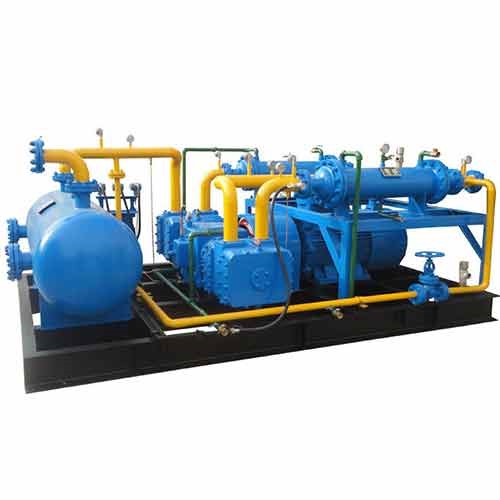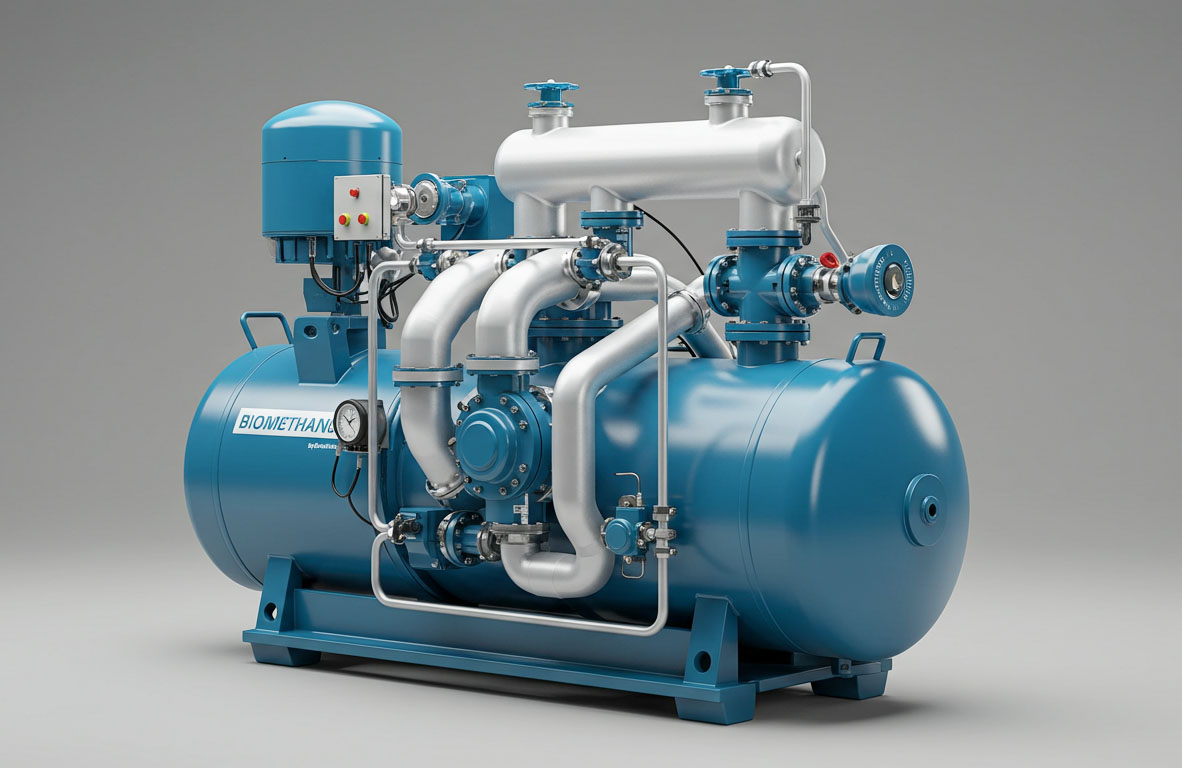Helium Hydrogen Natural Gas Compressors: A Comprehensive Guide (2024)
On the Periodic Table, helium is the second-lightest element. However, it is often overshadowed by its much more plentiful cousin, hydrogen. Helium’s unique set of properties makes it an essential resource for countless industries. Helium Hydrogen Natural Gas Compressors are very interesting machines that are fundamental to the hydrogen economy, with safety being paramount. Let us explore more about them.
Understanding Helium Hydrogen Natural Gas Compressors
The compressors for each gas have to be designed in a way that takes into account the peculiarities of different gases, even though they have some things in common.
| Gas Property | Helium | Hydrogen | Natural Gas |
| Density | Very low | Low | High |
| Molecule Size | Small | Small | Large |
| Flammability | Inert | Highly flammable | Flammable |
Types of Compressors
Gas compression is a vast field comprising of several types of compressors that are best suited for helium, hydrogen, or natural gas depending on the properties of each. Below is an outline of major compressor categories for them:
Helium Compressors:
Diaphragm Compressors: These compressors without oil are gas-compressed using an oscillating diaphragm. This makes them ideal for areas where high-purity helium is essential such as leak detection and research labs.
Reciprocating Compressors (Oil-free): For helium applications, lubrication-free piston-driven compressors are preferred because contamination rapidly affects it. They are mostly used in helium recovery and refilling gas cylinders.
Oil-lubricated Reciprocating Compressors (Limited Use): Certain applications may use oil-lubricated reciprocating compressors for helium with special concerns about removing and purifying oil downstream although they are less common.
Hydrogen Compressors:
Oil-free Reciprocating Compressors: With hydrogen, safety comes first hence the essence of having designs that do not require any form of oil to prevent any possible pollution or risk of fire.
Centrifugal Compressors: Centrifugal compressors can be used when the desired application needs a slightly increased level at moderate pressure increases in order to achieve large-scale hydrogen transportation along pipelines.
Emerging Technologies: Electrochemical compressors, which are still in the development stage offer silent operation with minimal moving parts making it a potential option for future hydrogen.
Natural Gas Compressors:
Reciprocating Compressors (Oil-lubricated): These workhorses, popularly among others, handle high pressures in natural gas due to their compatibility with lubrication by oils only.
Centrifugal Compressors: Natural gas pipeline networks largely use centrifugal compressing devices as a result of their ability to accommodate high flow rates hence ideal in large-scale transportation processes.
Screw Compressors: Natural gas rotary compressors requiring continuous flow and medium pressures can adopt screw compressors.
Choosing the Right Helium Hydrogen Natural Gas Compressors:
The choice of compressor depends on the specific gas and its intended use. Here are some key factors to consider:
Desired Pressure and Flow Rate: Match the compressor’s capabilities to your application’s requirements.
Safety Features: For hydrogen, prioritize explosion-proof designs and leak detection systems.
Maintenance Needs: Oil-free compressors offer cleaner operation but may require more frequent maintenance.
High Efficiency, Low Oil, and Lightweight Designs
Each year brought about technological improvements, embracing state-of-the-art- high efficiency, low oil emergency stop control, and lightweight designs which made broken parts easier to handle at my refinery for example when the biggest compressor section ceased operating like last night’s worn-out tyres.
One such embodiment that was the talk of a dinner meeting met its downfall as part performance faltered and it emerged from the dead. Helium-specific compressors are designed to address the challenges posed by this gas.
This is evident in the case of the helium cooling system for the Huge Toroidal volume in a large superconductor device.
Maintaining Helium Purity with Oil-Free Compressors
When the helium compressors are running, nitrogen is added to the helium hydrogen natural gas compressorscooling fluid as a damping agent and this small; difference in temperature causes a rapid dropoff of interference. The low density of helium necessitates compressors with higher compression ratios to achieve the desired pressure levels. Additionally, for applications involving cryogenics (extremely low temperatures), material selection becomes crucial.
Helium hydrogen natural gas compressors used in these scenarios require components that can withstand the intense cold without becoming brittle. Furthermore, maintaining helium purity is paramount in certain applications. Oil-free compressors are frequently employed for this purpose.
These helium hydrogen natural gas compressors utilize non-lubricating mechanisms to prevent oil contamination, ensuring the purity of the helium used in electronics and healthcare.
Applications of Helium Hydrogen Natural Gas Compressors Across Industries
Compressors are important tools in making the most out of helium, hydrogen, and natural gas. Let us go through different applications enabled by these compressed gases:
Helium compressors:
Research & Science: with its boiling point being as low as that of helium, it is an ideal cryogenic need. These compressors enable the circulation of helium in research platforms like the large hadron colliders or when cooling superconducting magnets within MRI.
Leak Detection: owing to the fact that it has a small-sized molecule; hence capable of infiltrating minute leaks. Hence, compressors are used for leak detection within industrial areas and pipelines where pressurized helium is required.
Metalworking & Inert Atmospheres: since helium is inert it prevents oxidation. As such, compressors are utilized during metal welding as well as heat treatment to make sure that oxygen-free conditions are achieved.
Aerospace & Defense: Helium acts as a lifting gas for airships and balloons. So, helicopters fill up their tanks with helium while others it purge their fuel tanks including those used in missiles and rockets.
Hydrogen Compressors:
Clean Energy: Hydrogen is an environmentally friendly fuel source. Thus, compressors play a crucial role in hydrogen refueling stations thus enabling pressurization of hydrogen for both vehicles and power generation.
Industrial Processes: Within various industrial applications such as ammonia production or hydrogenation (hydrogen adding) processes involving hydrogen gas usage, compressors aid in sustaining this pressure level needed.
Oil & Gas Refining: Hydrogen is employed in the hydrocracking process to break down heavy hydrocarbons into lighter fuels. For this process to occur there must be high-pressure hydrogen which is supplied by compressors.
Semiconductor Industry: There are thin films made on silicon wafers using the lithography method which needs high pressure and a pure form of hydrogen gas. This means that compressions maintain the correct required pressure for such delicate procedures.
Natural Gas Compressors:
Power Generation: Natural gas is widely used as a fuel for electricity generation. Therefore, compressors are essential in the transportation of natural gas via pipelines and its pressurization during storage and power plants.
Residential & Industrial Heating: In homes as well as business premises, natural gas is commonly used for heating. Hence, to maintain the pressure in distribution networks that ensures a continuous flow of gas, compressors come into play.
Industrial Processes: For instance, glass manufacturing thus requires high pressures which can be offered by compressors. On the other hand, some processes require natural gases such as food production and metal works this is why we need these machines to ensure they reach high points of pressure.
Compressed Natural Gas (CNG): Some buses or trucks use compressed natural gas (CNG) as their fuel. Thus CNG filling stations require compressors.
Helium Hydrogen Natural Gas Compressor Future
Within the future of Helium, there is hope eternal. Research into rehabilitation and recovery techniques offers great potential for sustainable utilization. In addition, technological improvements in compressors could further optimize Helium usage across an even wider range of applications. Helium compressors are sure to be the quiet power pushing progress in the future, behind every one of our important discoveries in medicine, astronautics, electronics: Hellospace even!
Conclusion
Due to its special properties helium has been like the silent employment office in so many industries. And helium’s influence on progress stands up to no qualms whatever; from the very beginning it’s been about facilitating life-saving medical scans and transporting rockets into outer space. Helium compressors play a part in this progress too. They make it feasible to utilize the gas and keep it in reserve.
Recycling programs are vital for extending the life of a resource like helium that has already reached such low levels. With helium captured and purified from different sources much less reliance will be put on virgin helium. Helium compressors dedicated to dealing with the problems of this gas, ensure its efficient use, and maximum benefit is obtained from it while waste is kept to a minimum.
Read more: Heavy-Duty Gas Compressor: Industrial Power Guide 2024


